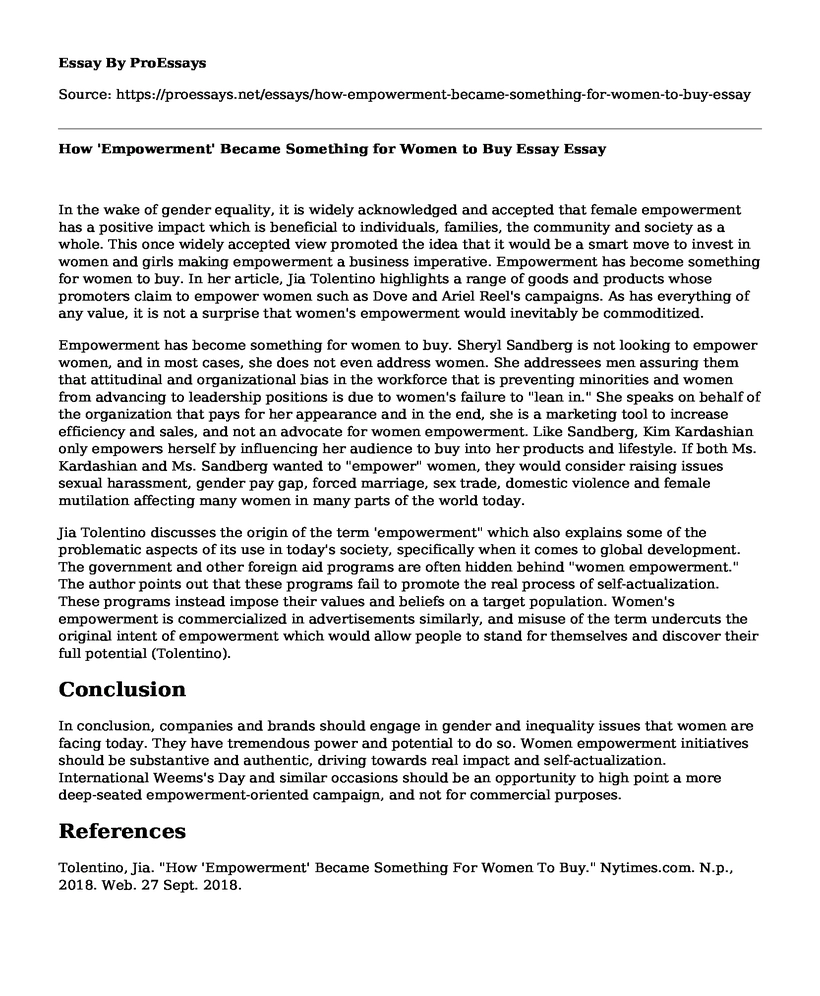In the wake of gender equality, it is widely acknowledged and accepted that female empowerment has a positive impact which is beneficial to individuals, families, the community and society as a whole. This once widely accepted view promoted the idea that it would be a smart move to invest in women and girls making empowerment a business imperative. Empowerment has become something for women to buy. In her article, Jia Tolentino highlights a range of goods and products whose promoters claim to empower women such as Dove and Ariel Reel's campaigns. As has everything of any value, it is not a surprise that women's empowerment would inevitably be commoditized.
Empowerment has become something for women to buy. Sheryl Sandberg is not looking to empower women, and in most cases, she does not even address women. She addressees men assuring them that attitudinal and organizational bias in the workforce that is preventing minorities and women from advancing to leadership positions is due to women's failure to "lean in." She speaks on behalf of the organization that pays for her appearance and in the end, she is a marketing tool to increase efficiency and sales, and not an advocate for women empowerment. Like Sandberg, Kim Kardashian only empowers herself by influencing her audience to buy into her products and lifestyle. If both Ms. Kardashian and Ms. Sandberg wanted to "empower" women, they would consider raising issues sexual harassment, gender pay gap, forced marriage, sex trade, domestic violence and female mutilation affecting many women in many parts of the world today.
Jia Tolentino discusses the origin of the term 'empowerment" which also explains some of the problematic aspects of its use in today's society, specifically when it comes to global development. The government and other foreign aid programs are often hidden behind "women empowerment." The author points out that these programs fail to promote the real process of self-actualization. These programs instead impose their values and beliefs on a target population. Women's empowerment is commercialized in advertisements similarly, and misuse of the term undercuts the original intent of empowerment which would allow people to stand for themselves and discover their full potential (Tolentino).
Conclusion
In conclusion, companies and brands should engage in gender and inequality issues that women are facing today. They have tremendous power and potential to do so. Women empowerment initiatives should be substantive and authentic, driving towards real impact and self-actualization. International Weems's Day and similar occasions should be an opportunity to high point a more deep-seated empowerment-oriented campaign, and not for commercial purposes.
References
Tolentino, Jia. "How 'Empowerment' Became Something For Women To Buy." Nytimes.com. N.p., 2018. Web. 27 Sept. 2018.
Cite this page
How 'Empowerment' Became Something for Women to Buy Essay. (2022, Aug 23). Retrieved from https://proessays.net/essays/how-empowerment-became-something-for-women-to-buy-essay
If you are the original author of this essay and no longer wish to have it published on the ProEssays website, please click below to request its removal:
- Essay Example on Social Workers' Ethics
- Essay on Documentary Analysis: 13th (2016), The Mask You Live In (2015)
- Policing Strategies in Hot Spot Regions - Literature Review Example
- Miscommunication Causes Costly Losses to Company Reputation - Essay Sample
- Essay on Importance of ICT in Education
- Behold! A Parent's Dream: My Son Achieves Milestone at Finals! - Essay Sample
- Paper Example on 90% of US Struggling with Addiction: Refining Access to Treatment Services







